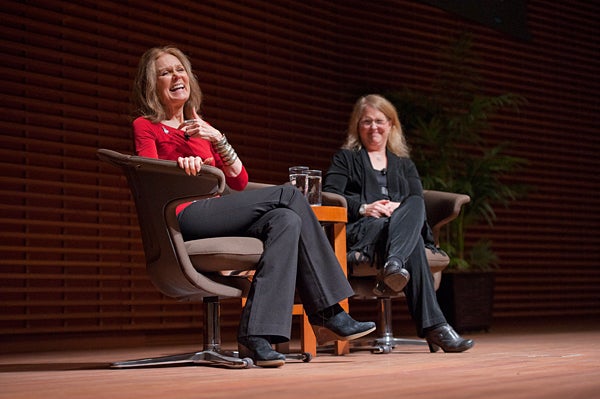|
View video here.
January 27, 2012
The feminist struggle continues, Gloria Steinem says, encouraging a Stanford audience toward 'one new subversive thing'
The co-founder of Ms. magazine celebrates the 40th anniversary of the pioneering publication. By Brooke Donald

After her talk, Gloria Steinem, left, answered questions from the audience with English Professor Shelley Fisher Fishkin, director of the American Studies Program. (Photo: Linda A. Cicero / Stanford News Service) Author and activist Gloria Steinem challenged a Stanford audience on Thursday to fight social injustice with outrageous acts, and offered several targets in the struggle for equal rights.
"I'm hoping that when we leave here today, we will all have one new subversive thing that we're going to do," she said.
Speaking to a sold-out crowd as part of a celebration of the 40th anniversary of Ms. magazine, which she co-founded, Steinem told her audience that if everyone in the room promised to do one outrageous thing in the cause for social justice, "by the weekend the world will be better."
And, she said, "you will have such a good time, you'll never get up in the morning without saying, 'What outrageous thing will I do today?'"
Steinem, who became the face of the feminist movement in the 1970s, rejected the notion that young women are no longer involved in the fight. She called the assumption troubling, and praised several young women for working for the rights of domestic workers, blogging to teens about feminism, helping girls get arts education and providing proper clothes for women entering the workforce.
"Polls show that young women are more likely to support feminist issues than older women," she added.
Steinem said the issues that need to be confronted today involve the treatment of caregivers, violence against women, reproductive freedom and motivating women to vote.
"We could attribute an economic value to care giving," she said. "It's not hard. We do not need a bill. We just change the tax code." She said a third of the work done in the United States is care giving – to children, the elderly or the sick – but it doesn't count as work.
She also said there needs to be more cooperation among various rights movements.
"Social justice movements need to take responsibility for failing to emphasize the connection and linkage between all of our movements," she said. "Categories can be the enemies of connection. We must get past that. We must go from dependence to independence to interdependence."
Steinem, who began her lecture with a quip about being nervous about the speech, said humor and laughter, joy and kindness can help overcome patriarchy and racism. People treat other people well if they believe they are respected and heard, she said.
The first issue of Ms. magazine was published in 1972 and had on its cover an illustration of the Hindu goddess Kali, tears streaming down her face while she juggles with eight arms in an attempt to keep pace with her work and household tasks. That first edition featured articles on abortion and encouraged women to respect themselves.
It was ground-breaking journalism at the time, and exceeded expectations, selling out in just a few days and garnering 26,000 subscriptions within weeks of its launch.
Steinem reflected on the magazine's ability to prompt dialogue about issues not being discussed in mainstream media. But she said she wanted to spend most of her time speaking about the tasks for the future. "That's what interests me," she said.
She encouraged audience members to announce what trouble-making organization they were involved in, and the crowd complied. One woman sought support for her candidacy for state senate. Another told of her fight for the rights of hotel workers. And another asked for support for an online march aimed at protecting reproductive rights.
"We have learned from Arab Spring and Occupy everything … how important it is to be present," Steinem said.
As part of the 40th anniversary celebration, Stanford is hosting a series of lectures, film screenings, performances and exhibits. The "Ms. at 40 and the Future of Feminism" series will run into March.
-30-
|